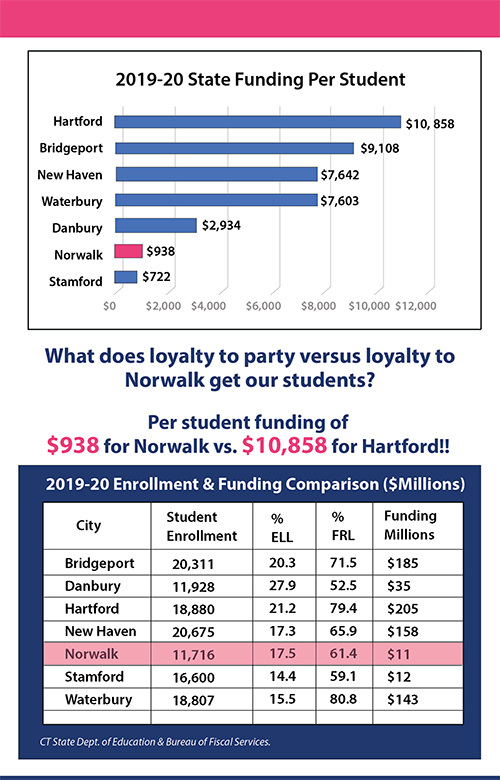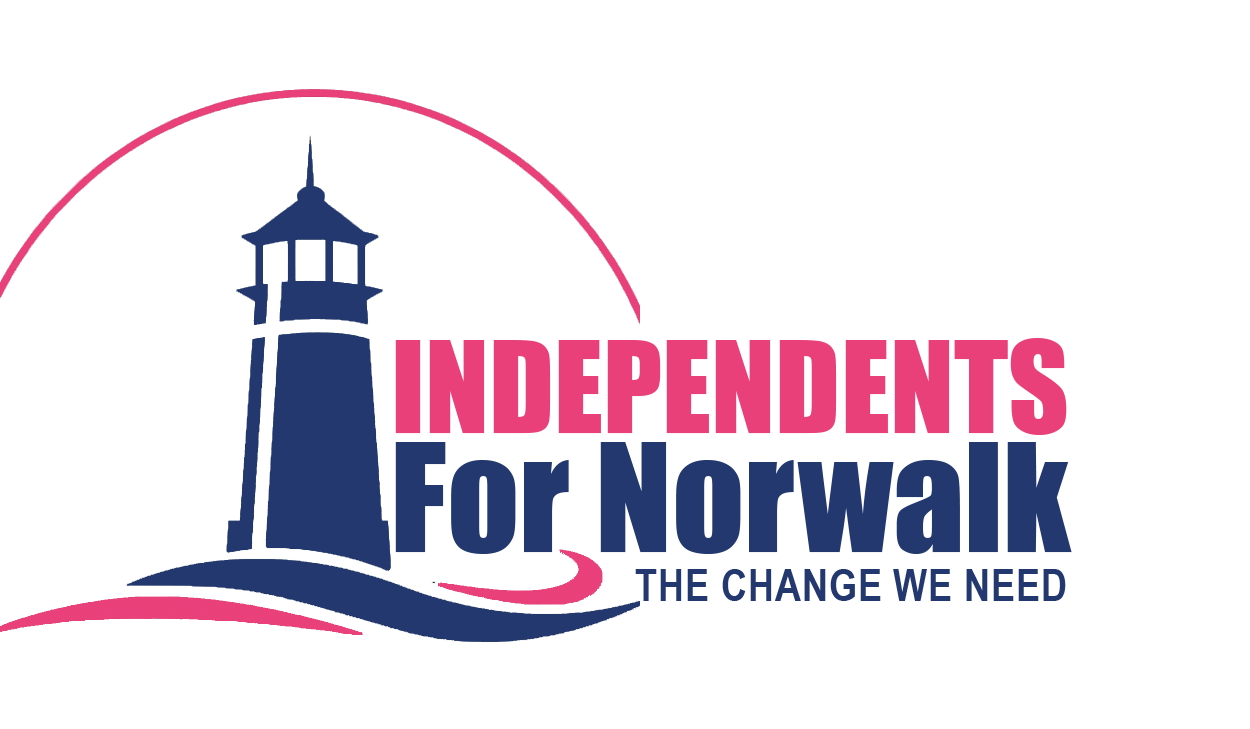Smarter Growth
Manage Existing Density Issues Impacting Quality of Life
Norwalk’s greatest asset is its neighborhoods. Hartford’s single party rule and overt influence on Norwalk’s local government has resulted in overdevelopment and unfunded mandates. It’s not sustainable and damaging resident’s quality of life. Over the past ten years, we’ve grown more than any other state municipality and can’t keep up! Density has come before city infrastructure or sustainability studies, impacting neighborhood streets, sewers and schools. Too many 2-way streets are impassable from on street parking, main routes are congested and coastal communities flood. Our beloved beaches received a ‘C’ rating from Save the Sound for water quality. Increased rains leave residents with a sewer system that can’t keep up. Schools are overcrowded. The Independent Party wants a sustainable future and commits to advocating for policies that promote:
Fix parking & road safety. It’s not enough to paint bicycle lanes on a road and think its safe. Increased development must bring traffic calming, sidewalks, crosswalks and other best practices to ease congestion and encourage walkability. On street parking has reached a breaking point in many neighborhoods. This must be addressed before any zoning changes.
Protect open space, parks & waterfront: Norwalk is the second most densely populated city in Fairfield County, behind Bridgeport. Conserving our natural green and blue infrastructure for recreation, environmental and ecological reasons also preserves Norwalk’s local maritime heritage, culture and economy for future generations.
Third party funding for sewer treatment. Increased density has brought more people and flushes. Future investments ($128 Million) in the sewer plant should receive financial support from BOTH the state and corporate developers. Long standing residents should not bear the burden.
Reprioritize Budget Spending; Secure more state funding for schools. Student population is declining across the state, while Norwalk’s is growing. The state has not adjusted its Education Cost Sharing formula (ECS) to account for the shifts in student demographics, both in terms of increased enrollment and poverty. Norwalk politicians remain silent. This must change.
Representative & Professional Government
Real Charter Revision
As Norwalk has evolved as a city over its 100+ years, so must its city charter outlining how city hall operates. We support updating the charter, but reject the 4-year mayoral term change, until other revisions are made that promote more representative, democratic and professional government with checks and balances to safeguard transparency. This includes:
Minority Party Representation: Our first-past-the post election system means nearly half of voters have no voice on the Council or Board of Education. That’s not democracy. Currently, 24 out of 25 of Norwalk’s major offices are from ONE party, despite 45% of the electorate voting differently. Single party rule leads to complacency, group think and lack of vigorous debate of the issues. Norwalk is one of only THREE municipalities, out of 169 in Connecticut, that DOES NOT have a charter provision for some form of opposition party representation or ‘seat cap’ of the political majority for either the Council or Board of Education.
Stronger Language Re: Ethics & Code of Conduct: Media stories over local government decision-making highlight the need for tighter regulation of ethical behavior and code of conduct. Years of transparency issues have captured residents’ attention, ranging from freedom of information complaints over the school budget process, to use of public office for receipt of grant monies, to no bid contracts or questionable zoning approvals. While most public officials conduct business without ethical missteps, any violation can cast a cloud upon the entire city, raising suspicion that a culture of insider, crony behavior is acceptable. While the charter addresses ethical behavior in its Standards of Conduct section, the language is still vague. This impacts enforcement, the responsibility of the Board of Ethics, whose activities include hearing, investigating and rendering advisory opinions over ethics complaints to the Common Council..
City Manager vs a Mayoral Chief of Staff: The most common form of local government in the United States is a council-manager. A city manager bridges the gap between politics, city administration and operations. A city manager SERVES AND REPORTS TO THE COUNCIL bringing professional experience and expertise instead of purely political leadership to the day-to-day running of a municipality. The position does not exclude a mayor, but provides the benefit of more professional management and better balance of power. Norwalk’s current administration uses a chief of staff instead of a city manager. Our issue is the position does NOT report to the council, but to the mayor, whose charter powers are already quite extensive, including the appointment of ~ 50 city boards and commissions. Norwalk would be better served by a professional versus political appointee.
Economic Sustainability
Address Impact of Housing Density, Enrollment & the School Funding Crisis
The first and largest bill the City of Norwalk pays is to the Board of Education, representing 53 percent of the city’s annual operating budget. When planning and zoning and the property tax revenue that goes with land use is disconnected from education, it impacts the funding to our schools and other city departments. The Independent Party will put Norwalk’s budget crisis front and center and won’t support policies that increase density, but don’t add sufficient revenue to the tax base. This includes incentives to politically connected developers or turning a blind eye to absentee landlords of illegal multifamily houses, charging high rents, often in unsafe, overcrowded, blighted buildings. We support the following economic policies:
Audit tax incentive development projects: We support a public audit of Norwalk’s housing developments and enterprise zones, so residents understand the true financial impact of large scale projects on the city’s current and near term finances. Many argue these types of tax incentives are unfair because they shift financial burden to existing residents or that the allocation of city resources displaces funding for other needed public facilities and services. To date, these sorts of tax incentives penalize smaller scale developers in favor of larger, more politically connected projects and developers, who ultimately sell out to Real Estate Investment Trusts (REITs) with no vested interest in the community.
Enforcement and fines for ordinance violations: Decades of poor enforcement of existing ordinances involving illegal apartments, on street parking, blight, safety and other violations is a lost revenue opportunity for the city. Now coming to a head in light of increased density, Norwalk needs more robust enforcement of violations and repeat violators impacting both quality of life and economic health of the city.
Address Hartford’s education funding inequity: Hartford gives tax breaks to developers, but won’t fairly fund Norwalk’s public schools, consistent with other cities with similar student demographics. Long overdue is Norwalk’s receipt of its fair share of education funds from Hartford, needed for teachers and improved academics in the classroom. State funding inequity via the Education Cost Sharing (ECS) program has been a decades old problem, again, but exacerbated by the city’s pursuit of increased population density. Until local and state politicians make more noise in Hartford, the Board of Education must prioritize its budget and spending. Not everything costs money – like raising adult expectations and standards for student performance and behavior. Courageous conversations over the state of Norwalk’s schools are needed.

